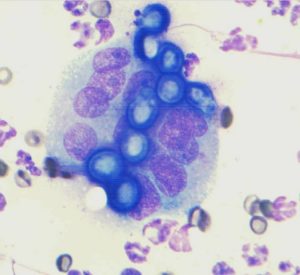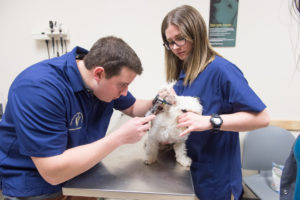Video by Lacuna Diagnostics
They say innovation often happens at the edges and intersections of disciplines. Lacuna Diagnostics, a company founded by four graduates of Colorado State University’s M.B.A. program, puts this paradigm into action.

The veterinary startup is pioneering cloud-based technology that allows veterinarians to upload images of cytologies (samples of tissue or fluid on a slide) and blood smears through digital slide scanners, microscope cameras, or cell phones. The images are examined by Lacuna’s team of board-certified veterinary pathologists who provide an interpretation of the slide back to the veterinarian in minutes.
This new technology cuts hours to days off traditional slide processing, which has been limited to the speed of mail and courier services. Getting a fast diagnosis allows veterinarians to treat patients with confidence and enhances the quality of care provided to pets.
For example, if a veterinarian notices a lump on a patient, it is important to know whether that lump is cancerous or not. The veterinarian poke the lump with a small needle to sample some of the cells, then transfers those cells to a glass slide, which is examined by a veterinary pathologist.
Lacuna is helping to eliminate transit time of the slide to a pathologist. With digital upload of the slide images, the pathologist can look at the slide within minutes of sampling and provide an interpretation with the client and the pet still in the exam room.
“We called the company Lacuna because in biology, a lacuna is a space or gap. We saw our company as filling a space or gap in medicine.” -Aaron Wallace
Lacuna’s goal is to make digital cytology a norm in veterinary medicine, delivering quality telemedicine services to any veterinary hospital regardless of location or clinical size.
Business side of medicine

Lacuna is poised to make a substantial impact on the veterinary industry. The company got its start in 2014 when two of the founders, Aaron Wallace and Conor Blanchet, met in CSU’s combined Doctor of Veterinary Medicine/Masters of Business Administration program. One of many combined degree programs offered by the College of Veterinary Medicine and Biomedical Sciences, the D.V.M./M.B.A.is geared toward veterinary students who want to understand the business side of medicine.
“Throughout the M.B.A. program, we would constantly discuss business ideas that applied our education to the veterinary market,” says Blanchet, who eventually landed on the idea of digital cytology while working in the clinical pathology lab at the James L. Voss Veterinary Teaching Hospital. “Processing pathology samples during the day while taking business classes at night caused two worlds to collide. I suddenly saw connections and opportunities that never resonated with me before.”
Wallace and Blanchet teamed up with Bikul Koirala and Garrett Walz, fellow classmates in the M.B.A. program with backgrounds in app design, IT infrastructure, marketing, and business development. At first, Lacuna lived only within the boundaries of their final project for business school. But as the team compiled more feasibility research on telehealth and veterinary medicine, they realized that digital cytology was an inevitability for the veterinary field. If they did not create the product, someone else would.

“It was a big jump to take the company beyond our capstone,” says Wallace. “We knew we were taking a risk. But with the experience we gained during the M.B.A., we had the traction we needed to make the risk seem feasible. We called the company Lacuna because in biology, a lacuna is a space or gap. We saw our company as filling a space or gap in medicine.”
At first, the company was the ultimate side hustle for the team. “We were meeting on weekends, after our veterinary classes, around full-time jobs,” remembers Blanchet. “The company took off quickly which meant we were constantly juggling life and Lacuna.”
Major milestones
Since those early days, Lacuna Diagnostics has hit several major milestones. After installing in its first hospital in June 2017, Lacuna won the Pet Project competition, which gave the company $25,000 in funding as well as nationwide attention. Since then, Lacuna has gone through a major investment round, and two of the founders, Koirala and Blanchet have transitioned to full-time roles in the company. Hospitals in 14 states, Canada, and Taiwan now use the Lacuna system.

Now, as one of six featured companies accepted into the only pet-specific business accelerator, Leap Venture Studio, Lacuna is ready to scale quickly. Specifically designed to assist pet health companies, Leap, in partnership with digital branding agency R/GA, is providing Lacuna with mentors and resources from leaders across the veterinary industry. The accelerator is backed by Mars Petcare and Michelson Found Animals Foundation, a nonprofit dedicated to keeping animals in their homes.
While in the accelerator, the company hopes to prioritize operational efficiency while maintaining its standard for impeccable customer service.
“We are driven to provide something better for our customers and our pathologists,” says Walz. “We believe that digital cytology will transform the way veterinary hospitals provide care. It is exciting to be delivering a valuable service.”
But as quickly as Lacuna is moving, the team have never lost sight of their beginnings. “We became classmates first, friends second, and business partners third,” says Koirala. “We are anchored by that trust and friendship, which allows us to abandon the ego that can sometimes come with startups. I feel extremely fortunate to have had this opportunity to build a business with my friends.”